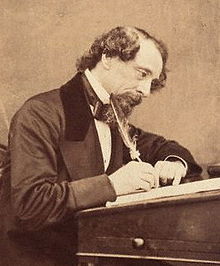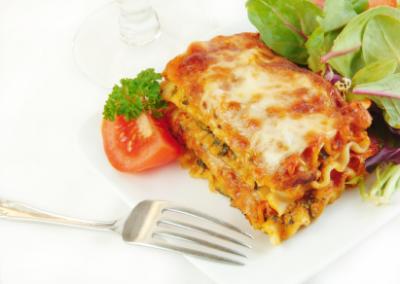دنیای زبان انگلیسی ( بهروزپور )
لغات و اصطلاح .داستان کوتاه . شعر.جوک .ضرب المثل.اشپزی.رمان. نمایشنامه.متن دوزبانهدنیای زبان انگلیسی ( بهروزپور )
لغات و اصطلاح .داستان کوتاه . شعر.جوک .ضرب المثل.اشپزی.رمان. نمایشنامه.متن دوزبانهsmiling

Smiling is
infectious,
you catch it like the flu.
when someone smiled at me today,
I started smiling too.
I passed around the corner,
and someone saw my grin.
when he smiled I realized.
I'd passed it on to him!
I thought about that smile,
then I realized it's worth.
a single smile just like mine,
could travel round the Earth
what-am-i- چیستان
RIDDLE ME THIS
Violet, indigo, blue and green, yellow, orange and red; these are the colors you have seen after the storm has fled.
I am now black but once was red.
Charles Dickens
Charles John Huffam Dickens (pronounced /ˈtʃɑrlz ˈdɪkɪnz/; 7 February 1812 – 9 June 1870) was the most popular English novelist of the Victorian era, and he remains popular, responsible for some of English literature's most iconic characters.[1]
Many of his novels, with their recurrent concern for social reform, first appeared in magazines in serialised form, a popular format at the time. Unlike other authors who completed entire novels before serialisation, Dickens often created the episodes as they were being serialized. The practice lent his stories a particular rhythm, punctuated by cliffhangers to keep the public looking forward to the next instalment.[2] The continuing popularity of his novels and short stories is such that they have never gone out of print.[3]
His work has been praised for its mastery of prose and unique personalities by writers such as George Gissing, Leo Tolstoy and G. K. Chesterton; though others, such as Henry James and Virginia Woolf, criticised it for sentimentality and implausibility.
Literary style
Dickens loved the style of 18th century Gothic romance,[citation needed] although it had already become a target for parody.[citation needed] One "character" vividly drawn throughout his novels is London itself. From the coaching inns on the outskirts of the city to the lower reaches of the Thames, all aspects of the capital are described over the course of his body of work.
His writing style is florid and poetic, with a strong comic touch. His satires of British aristocratic snobbery—he calls one character the "Noble Refrigerator"—are often popular. Comparing orphans to stocks and shares, people to tug boats, or dinner-party guests to furniture are just some of Dickens's acclaimed flights of fancy. Many of his characters' names provide the reader with a hint as to the roles played in advancing the storyline, such as Mr. Murdstone in the novel David Copperfield, which is clearly a combination of "murder" and stony coldness. His literary style is also a mixture of fantasy and realism.
Characters

Dickens is famed for his depiction of the hardships of the working class, his intricate plots, and his sense of humour. But he is perhaps most famed for the characters he created. His novels were heralded early in his career for their ability to capture the everyday man and thus create characters to whom readers could relate. Beginning with The Pickwick Papers in 1836, Dickens wrote numerous novels, each uniquely filled with believable personalities and vivid physical descriptions. Dickens's friend and biographer, John Forster, said that Dickens made "characters real existences, not by describing them but by letting them describe themselves."[45]
Dickensian characters—especially their typically whimsical names—are among the most memorable in English literature. The likes of Ebenezer Scrooge, Tiny Tim, Jacob Marley, Bob Cratchit, Oliver Twist, The Artful Dodger, Fagin, Bill Sikes, Pip, Miss Havisham, Charles Darnay, David Copperfield, Mr. Micawber, Abel Magwitch, Daniel Quilp, Samuel Pickwick, Wackford Squeers, Uriah Heep and many others are so well known and can be believed to be living a life outside the novels that their stories have been continued by other authors.[citation needed]
Lasagna :لازانیا
About this Recipe: Navid: This is a basic and simple lasagna recipe. You can replace the beef filling with vegetarian alternatives such as spinach and mushroom. You can also try fresh lasagna noodles for this recipe. |
Main Ingredients:
Lasagna: 12 noodles
Ground beef: 1 lb (500 grams)
Crushed Tomatoes: 1 can (2 cups)
Tomato paste: 6 tbsp
Onion: 1 medium, chopped
Garlic: 1 clove, diced
Bell pepper: 1 small, chopped
Olive oil: 3 tbsp
Ricotta cheese: 1 lb (500 grams)
Parmesan cheese: 0.25-0.5 cup, grated
Mozzarella cheese: 1-1.5 cup, shredded
Fresh Basil: 1 tbsp, chopped (or 1 tsp dried)
Salt
Pepper
Julius Caesar :play
Gaius Julius Caesar[2] (13 July 100 BC[3] – 15 March 44 BC)[4] was a Roman general and statesman. He played a critical role in the gradual transformation of the Roman Republic into the Roman Empire.
In 60 BC, Caesar entered into a political alliance with Crassus and Pompey that was to dominate Roman politics for several years. Their attempts to amass power for themselves through populist tactics were opposed within the Roman Senate by the conservative elite, among them Cato the Younger with the frequent support of Cicero. Caesar's conquest of Gaul extended Rome's territory to the North Sea, and in 55 BC he conducted the first Roman invasion of Britain. These achievements granted him unmatched military power and threatened to eclipse Pompey's standing. The balance of power was further upset by the death of Crassus in 53 BC. Political realignments in Rome finally led to a stand-off between Caesar and Pompey, the latter having taken up the cause of the Senate. Ordered by the senate to stand trial in Rome for various charges, Caesar marched from Gaul to Italy with his legions, crossing the Rubicon in 49 BC. This sparked a civil war from which he emerged as the unrivaled leader of the Roman world.
After assuming control of government, he began extensive reforms of Roman society and government. He centralised the bureaucracy of the Republic and was eventually proclaimed "dictator in perpetuity". A group of senators, led by Marcus Junius Brutus, assassinated the dictator on the Ides of March (15 March) 44 BC, hoping to restore the constitutional government of the Republic. However, the result was a series of civil wars, which ultimately led to the establishment of the permanent Roman Empire by Caesar's adopted heir Octavius (later known as Augustus). Much of Caesar's life is known from his own accounts of his military campaigns, and other contemporary sources, mainly the letters and speeches of Cicero and the historical writings of Sallust. The later biographies of Caesar by Suetonius and Plutarch are also major sources.
ادامه مطلب ...یک داستان انگلیسی با ترجمه فارسی (جالب)
A man checked into a hotel. There was a computer in his room* so he decided to send an e-mail to his wife. However* he accidentally typed a wrong e-mail address* and without realizing his error he sent the e-mail.
Meanwhile….Somewhere in Houston * a widow had just returned from her husband’s funeral. The widow decided to check her e-mail* expecting condolence messages from relatives and friends.After reading the first message* she fainted. The widow’s son rushed into the room* found his mother on the floor* and saw the computer screen which read:
To: My Loving Wife
Subject: I’ve Reached
Date: 2 May 2006
I know you’re surprised to hear from me. They have computers here* and we are allowed to send e-mails to loved ones. I’ve just reached and have been checked in. I see that everything has been prepared for your arrival tomorrow. Looking forward to seeing you TOMORROW!Your loving hubby.
مردی اتاق هتلی را تحویل گرفت .در اتاقش کامپیوتری بود،بنابراین تصمیم گرفت ایمیلی به همسرش بفرستد.ولی بطور تصادفی ایمیل را به آدرس اشتباه فرستاد و بدون اینکه متوجه اشتباهش شود،ایمیل را فرستاد.
با این وجود..جایی در هوستون ،بیوه ای از مراسم خاکسپاری شوهرش بازگشته بود.زن بیوه تصمیم گرفت ایمیلش را به این خاطر که پیامهای همدردی اقوام و دوستانش را بخواند،چک کند. پس از خواندن اولین پیام،از هوش رفت.پسرش به اتاق آمد و مادرش را کف اتاق دید و از صفحه کامپیوتر این را خواند:
به: همسر دوست داشتنی ام
موضوع: من رسیدم
تاریخ: دوم می 2006
میدانم از اینکه خبری از من داشته باشی خوشحال می شوی.آنها اینجا کامپیوتر داشتند و ما اجازه داریم به آنهایی که دوستشان داریم ایمیل بدهیم.من تازه رسیدم و اتاق را تحویل گرفته ام.می بینم که همه چیز آماده شده که فردا برسی.به امید دیدنت، فردا
شوهر دوستدارت
منبع:tf89.com



